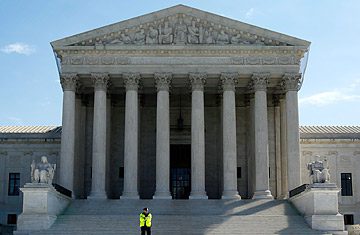
A police officer stands in front of the Supreme Court on April 9, 2010
Former Enron chief executive Jeffrey Skilling scored a partial victory on Thursday when the Supreme Court sharply limited a law that prosecutors routinely rely on to convict corporate executives and government officials, the "honest services" law. TIME's Deirdre van Dyk spoke to Robert Weisberg, professor at Stanford Law School and co-director of the Stanford Criminal Justice Center, about how this decision may affect the case against Skilling and other prosecutions, like the trial of former Illinois governor Rod Blagojevich.
Explain the Enron case, and why the court ruled on this.
The gist of the charge against Skilling was that he misrepresented the earnings of the company. The prosecutors also had a securities-fraud count. But the government didn't have enough confidence in that part of the case, and it blended securities fraud with honest-services fraud in a conspiracy count. The honest-services law purports to make it a federal crime to deprive someone of honest services to which that person is entitled. If that sounds unbelievably broad and vague, it is. And the court agreed.
Where did the prosecutors go wrong?
If Skilling is accused of lying about the financial health of the company, then the proper charge should've simply been material misrepresentation under securities fraud. Because they asked for too much, the government is now in the position of having to establish, in the lower court, that the conspiracy charge can still stand under the security-fraud theory because it was not infected by the honest-services theory, which has now been struck down.
So what happens to other cases that were successfully prosecuted using the statute?
It's going to allow for other cases to be appealed more successfully, or even reopened. Those prosecutors who invested in this particular statute as a way of strengthening their cases are going to face the risk of their cases being overturned. But in white collar crime, you get a lot of guilty pleas, because the defendant cooperates, and it's really hard to reopen a case when you have a guilty plea.
What other cases might be overturned?
Well, in addition to Conrad Black, the Canadian financier who was busted for fraud, there are a lot of other cases kicking around in the lower courts. Some of them involve politicians. It might even involve parts of the Rod Blagojevich case. I say "parts" because if the former Illinois governor took bribes, he can still be convicted. But to the extent that politicians just feathered their own nests and engaged in illicit patronage — appointing relatives to office — that might not be punishable under this act. There's also the issue of former New York state senate majority leader Joseph Bruno, who may reopen part if not all of his case. He was convicted of financial conflict of interest under the honest-services law, and the prosecutors never formally charged that he took bribes or kickbacks.
